http://gleneayreequestrianprogram.org/


Gleneayre Equestrian Program
573 Eayrestown Road
Lumberton, NJ 08048
Mailing Address:
573 Eayrestown Road
Lumberton, NJ 08048
Phone: 609-267-4104
MAKE AN INQUIRY
View our WEBSITE
EIN: 23-2513468Founded: 1988
View our PHOTO GALLERY
Profile Last Updated December 8, 2025Public Charity
Click here to view listing(s) of the program horses we are seeking
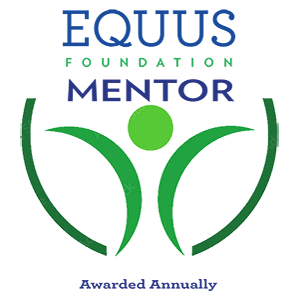
The Mentor Accreditation is awarded annually to an organization that operates at the highest standards for business and equine welfare practices in accordance with EQUUS Foundation guidelines for business and equine welfare practices outlined here.
Last Updated: May 31, 2025

MISSION & PROGRAMS
Mission:We exist to provide a hands-on, experience-based learning environment for people in difficult situations, including children, families, and military personnel. The powerful connection between people and horses is transformational. Through horsemanship, we develop character, learn ethics and responsibility, grow physically and emotionally, and discover ourselves. Our own lives improve as we improve those of our horses.
Our organization provides programs involved with equine retirement
Our organization conducts Equine Assisted Services in accordance with the EQUUS Foundation Guidelines on Qualifications of Organizations Conducting Equine Assisted Services (EAS).
Our organization provides outreach and/or public education programs involving horses.
100% of our total programs and services are equine-related.
Our organization is directly responsible for the care and shelter of equines involved in our programs.
Our organization CURRENTLY uses satellite, overflow, foster, and/or outreach facilities which adhere to all the policies, procedures and practices of our organization or did in the previous year. Facility information is provided for the organization's main, satellite and overflow facilities.
Please describe what steps your organization takes to ensure that:
1) all interactions between your equines and people are mutually beneficial and conducted in accordance with the Guidelines for Human-Equine Interactions stated below;
2) all equines in the care of our organization and/or equines that participate in the organization's program have access to clean drinking water at all times; nutritious food in sufficient quantity, including natural forage such as pasture grass and/or hay; appropriate veterinary, farrier, and dental care; shelter and protection from the weather; sufficient safe space to move around comfortably on a daily basis; and daily opportunity to freely interact and have contact with other equines:
At the Gleneayre Equestrian Program, we house a diverse group of safe donated horses for interaction with children. We provide a caring, happy home for horses whose show careers are over but with lots of life left. We maintain our horses to the highest standards, as we believe they are all irreplaceable and directly affect the success of our program. We prioritize always allowing our horses to have a choice in how and when they would like to engage with clients. In addition, our professionals are always instructed to be mindful of any nonverbal cues from our working horses to ensure that the appropriate course of action is taken to protect both the horses and human participants. Safety is our top priority, and through our programs, we can provide horses of all ages and backgrounds with a new purpose and the opportunity to give and receive the incredible benefits of healthy human-horse relationships in a secure environment.
All the horses are carefully selected for their temperaments and abilities to enter our Working Student riding program. Then, when the horses are no longer suitable for the riding program (often because of age), they move into our unmounted Equine Facilitate group programs. We provide our horses with a new sense of purpose outside of the show ring. When they are no longer able to participate in our programs, they are able to enjoy a long and happy retirement of leisure and love.
Health and safety for our horses is a priority. Our trained staff has access to Barn Manager, an online record system for each horse. This system includes feed and hay charts, supplements, veterinarian records, notes, and medical records. Backup feed, supplement, medicine, and turnout charts are also available. Feed, hay, supplements, and medication are coordinated with our veterinarians. Annual dental care or as needed dental care is provided along with hoof care every 4-8 weeks. Parasite control and fly insect control are also provided.
Each horse has its own 10 x 10 stall with a nameplate, a personal space that provides comfort and security. Maps and diagrams of horse stalls and pastures are posted, ensuring clear communication and organization. Horses have daily turnouts of 4 to 8 hours in wood-fenced pastures that are routinely checked and rotated. Horses always have access to water at all times, and all equines are checked overnight. The owner and caretaker live on the property, ensuring round-the-clock care and supervision.
Equine Transition Services:
Overview of our programs involved with rescue, rehabilitation, retraining, re-homing and/or retirement:
At Gleneayre, we use the powerful connection between horses and people to teach, learn, grow, and heal. Our own lives improve as we improve those of our horses, and so we provide a safe haven for our program horses to live with dignity, peace, and veterinary care for the remainder of their lives.
Some of our program horses were rescued directly from abusive situations, like Rosie who was abandoned in Philadelphia, and Snowflake who was used as pit-bull bait. Also, by accepting donated horses that are no longer able to compete at a professional level, we are taking a proactive approach to ensure that they never end up in a situation where they are mistreated.
All the horses are carefully selected for their temperaments and abilities to enter our Working Student riding program. Then, when the horses are no longer suitable for the riding program (often because of age), they move into our unmounted equine-facilitated group programs. We provide our horses with a new sense of purpose outside of the show ring, when they are no longer able to participate in our programs, they are able to enjoy a long and happy retirement of leisure and love.
Equine Assisted Services (EAS) Overview:
Overview of our programs involved with providing EAS to individuals with special needs:
Gleneayre Equestrian Program focuses on horses and people poorly served by more mainstream resources and programs.
We are committed to children facing challenges at school and home, families struggling with the unique demands of military life, and service members in need of support.
In particular, we know that all children have the potential to become healthy, active, and productive young adults, and our horses help us get through to those who are otherwise hard to reach.
We house a diverse group of horses for our program that are safe for interaction with children. We provide a caring, happy home for horses whose show careers are over, but who have lots of life left in them.
Horses that come to our farm are provided sanctuary and are treated with dignity and respect for the remainder of their lives. We offer a safe option for owners looking to re-home their horses.
The Equine Facilitated Learning Program is a curriculum-based, non-riding equine program for people experiencing difficulties, including academic, family, financial, and challenges associated with military families.
Through the EFL program, children can learn life skills that help to promote positive behaviors and foster healthy person-to-person contact. Horses are utilized as facilitators in the lessons to meet the student's emotional, social, and educational needs. This EFL program is an alternative for students who do not thrive in a traditional classroom. Our EFL Program has the transforming power of working with horses, who, as prey animals, are highly intuitive. As sentient animals who respond with clear body responses to pleasant, frightening, or frustrating experiences, horses offer humans an opportunity to develop give-and-take relationships that are not based on verbal exchange.
Our Equine Facilitated Learning Program is particularly well-suited for children, families, and corporate group training. Our staff can customize an experience that fits any needs and time constraints. Key outcomes include positive psychological (reduced aggression and anxiety), physiological (lowered blood pressure, heart rate, and stress hormones), and personal (sense of calm and self-awareness) improvement. GEP has partnered with Brookfield Schools. (https://brookfieldschools.org/). "Brookfield is a private school serving students needing intensive behavioral/therapeutic intervention."
Alison Johnson, Gleneayre Managing Director/Equine-Assisted Service Provider, meets with Brookfield's Lead Therapist, Jessica Ramsden, to coordinate the EAS (Equine-Assisted Services) curriculum with the school syllabus. Equine-Assisted Service Provider Kelley Spiegel, assistant teachers, social workers, and one-on-one aides from Brookfield accompany their students to the EAS classes. The skills learned during EAS are then incorporated into the academic lessons taught at Brookfield School.
We are also constantly seeking new opportunities and partnerships with organizations in the local community.
Gleneayre Equestrian Program Website description of EFL:
Learn skills with and through horses in our curriculum-based, non-riding program.
Research has demonstrated the benefits of human-animal contact for learning and well-being. Our Equine Facilitated Learning Program provides a unique alternative to a traditional educational setting.
Located on a beautiful 73-acre campus with a covered ring and an inviting classroom, we employ teaching strategies designed to reach people who might have difficulty in traditional classroom settings.
Our Equine Facilitated Learning Program is particularly well-suited for children, families, corporate and group training. Our staff can customize an experience that fits your needs and time constraints. Key outcomes include positive psychological (reduced aggression and anxiety), physiological (lowered blood pressure, heart rate, and stress hormones), and personal (sense of calm and self-awareness) improvement.
Equine Assisted Services (EAS) and Providers:
Our organization provides the following Equine Assisted Services (EAS):
Equine-assisted Learning in Education
Equine-assisted Learning in Personal Development
3: Total number of Equine Assisted Service Providers at Gleneayre Farm
1 Alison Johnson
FACILITY PARTICIPATION:
Gleneayre Farm
RELATIONSHIP: Employee
SERVICES PROVIDED:
Equine-assisted Learning in Education
Equine-assisted Learning in Personal Development
DEGREES, LICENSES AND/OR CERTIFICATIONS
Managing Director and Trainer, Alison Johnson, is certified by EAGALA and Strides to Success and has been with the Program since 2001. She also has a degree in psychology and equine science from the University of Massachusetts Amherst.
Alison conducts Equine-Assisted Personal and/or Professional Development sessions. Her role in providing Equine-Assisted Learning involves working with Brookfield's Lead Therapist to establish the curriculum and overseeing the sessions in which students are accompanied by assistant teachers, social workers, and one on one aides.
Alison has served as barn manager for Frank Chapot (former Olympian and Chef d'équipe of the US Equestrian Team) and spent 26 years as a riding instructor. She is a member of the USEF, USDF, USHJA, and ECRDA.
2 Brookfield Schools/Jessica Ramsden
FACILITY PARTICIPATION:
Gleneayre Farm
RELATIONSHIP: Other
SERVICES PROVIDED:
Equine-assisted Learning in Education
Equine-assisted Learning in Personal Development
DEGREES, LICENSES AND/OR CERTIFICATIONS
Jessica Ramsden, MA,LPC,NBCC, is the Lead Therapist at Brookfield Schools and earned her undergraduate degree from Rutgers University and her Master's degree at La Salle University. She is a licensed professional counselor and a National Board Certified Counselor. Jessica Ramsden work with Alison Johnson to coordinate the EAS curriculum with the school syllabus. Assistant teachers, social workers, and one-on-one aides from Brookfield accompany their students to the EAS classes. The skills learned during EAS are then incorporated into the academic lessons being taught at Brookfield School.
3 Kelley Spiegel
FACILITY PARTICIPATION:
Gleneayre Farm
RELATIONSHIP: Independent Contractor
SERVICES PROVIDED:
Equine-assisted Learning in Education
Equine-assisted Learning in Personal Development
DEGREES, LICENSES AND/OR CERTIFICATIONS
Kelley Spiegel has over 12 years of experience in education as a School Psychologist. She also has held a chairperson position supporting her fellow Child Study Team for over 5 years. Kelley has volunteered her time for the NJ Association of School Psychologists and was the Southern Delegate for several years. She holds her Master's and Educational Specialist Degree in School Psychology and her Supervisor's Certification and Principal Certification eligibility in School Administration.
Kelley has also been a lifelong equestrian, earning top ribbons at Devon, Harrisburg, Washington, etc., and National Year-End Titles on multiple mounts. She competed in NCAA Equestrian for the University of Georgia and won two National Championships, one individual Reserve National Championship, and four SEC Championships while there. Kelley is also certified by Strides to Success.
• Bachelors of Science in Psychology - University of Georgia
• Masters of Arts in School Psychology- Rowan University
• Education Specialist Degree in School Psychology - Rowan University
• Supervisor's Certificate in Education and Principal's Certification Eligibility
Outreach and/or Public Education:
Working Student Program:
The Working Student Program offers instruction in English riding, horsemanship, and farm and barn management skills in a structured and academically supportive environment designed for youth facing challenges. Participants fulfill a weekly work commitment and are assigned a horse to ride, care for, and compete with on a local circuit. Students ages 10 through 18 can apply and riding experience is not necessary. We look for applicants who love horses and who are driven to learn about riding and caring for them.
We pair students with their own horse and teach them all aspects of horsemanship. We instruct, monitor, and supervise our students closely. They are responsible for their horses, including grooming and exercising, cleaning stalls and tack, barn management, and limited aspects of supervised veterinary care.
The hallmark of Gleneayre’s programs is attention to each participant. The Working Student program offers youth guidance and stability they do not find at home or in school. Capitalizing on the students’ love of horses and desire to accomplish riding goals, the program serves as motivation to develop the participants’ openness to learning of all kinds. The program offers oversight by knowledgeable adults who encourage positive character development and good collaboration skills.
Our students work with their horses four days a week, one weekend day, and three days after school. Each student keeps a log of his or her horse’s care. The Working Student Program provides a safe space for our students to learn, develop, and grow. Key outcomes include relationship-building skills, personal responsibility, self-confidence, and healthy stress relief.
Veterans and active military families:
In 2024, the GEP engaged local military and veterans’ groups to develop the non-riding Veterans Equine Program. Our successful pilot welcomed local veterans for a 6-week interactive horse experience. Veterans met every Friday morning for coffee, donuts, socializing, peer support, and guided, hands-on interaction with horses, led by GEP’s experienced staff. This program is provided at no cost to service members and served 10 veterans this year. Through the partnership and support of local veteran programs, we plan to continue to develop our existing program curriculum to effectively bring the benefits of the human-horse connection to more populations within the military community.
This year Gleneayre partnered with a local non-profit serving veterans to provide a safe and private location to host a “Summer Retreat on the Farm”.
This retreat serviced 27 members of the Soldier and Family Readiness Group (SFRG) where they were able to meet and receive support from groups facilitated by veteran volunteers.
During that time experienced GEP staff, with the help of 10 volunteers from the local community, provided an educational, non-riding, hands-on activity for children of the SFRG members while parents attended the support groups. The local non-profit veteran volunteers team was able to lead support groups providing guidance and support for spouses, children, and family members of active-duty military members on their first deployment who typically are limited to virtual meetings or phone calls. The event was a great success, and we are excited to be able to provide the healing power of horses to support active-duty military members and their families as they proudly serve our country.
Girl scouts and Cub Scouts:
The Gleneayre Equestrian Program also offers presentations to local Girl Scouts and Cub Scouts, allowing them to learn about the horse-human connection while earning merit badges.
Research/Medical Use of Equines:
Our organization has never made, and would not ever consider making, equines available for research studies or medical training that involves invasive procedures and/or that which may cause pain or suffering to the equine.
Religious Affiliation:
Our organization does not promote religious education, religious purposes, or a specific religious faith or use donations for religious education or religious purposes; require participants to be of a certain faith; require participation in religious, instruction, activities or services; or require participation in prayer, worship, religious instruction or other religious activities as a condition of receiving social or secular services offered.
Auction Donation:
Our organization has never allowed, or would not consider allowing, an equine to be sold, transferred, released, or otherwise placed into possession of any person or organization that would cause or allow the equine to be sold at auction for slaughter.
POLICIES: INTAKE, ASSESSMENT & TRAINING
Prior to a horse being accepted and/or arriving at the facility, the organization has the following policies in place:The owner of a potential equine is interviewed over the phone or in person prior to seeing the equine
The equine is evaluated at its place of residence
The owner completes an application/contract which constitutes the agreement between the owner and our organization when the equine is acquired from the equine's owner other than by seizure or by abandonment
The owner is financially responsible for the shipping of the equine to and from the organization
If health records are not available or are out-of-date, our veterinarian will administer appropriate vaccinations
A health certificate signed by a veterinarian and dated no more than seven days prior to arrival is provided to our organization either prior to or upon arrival of the equine attesting to the health status of the equine
Trial Period: Check all that apply:
Equines are on trial for up to 30 days
The trial period may be reduced based on the equine's progress
During the trial period, the organization accepts total financial responsibility for the care of the equine, including board, feed, shoeing and any necessary veterinary care
The trial period may be terminated by either the organization or the owner for any reason
Equines are on trial up to 60 days
Equines are on trial for 60 or more days
During the trial period, the organization accepts financial responsibility for the care of the equine, including board, feed, shoeing and any necessary veterinary care, up to a fixed amount agreed upon by the organization and the owner
During the trial period, the owner/donor is financially responsible for the care of the equine, including board, feed, shoeing and any necessary veterinary care
Upon intake, the organization has the following quarantine policy in place:
The equine is confined to a designated and separate area for isolation and quarantine at the facility for a prescribed period of time
The equine is confined to a designated and separate area for isolation and quarantine off-site for a prescribed period of time
The equine is not quarantined
The typical length of quarantine is: 20 to 30 days
Following arrival of the equine at the facility, the following is performed:
Physical examination to include temperature, pulse and respiration by a trained staff member upon arrival
A Henneke Body Conditioning Score or other body conditioning score is assigned by a trained staff member upon arrival
Photographs are taken of each equine upon arrival at the facility and kept with the equine's health records
Physical examination by a farrier
Physical examination by a dentist
Physical examination to include temperature, pulse and respiration by a veterinarian upon arrival
A Henneke Body Conditioning Score or other body conditioning score is assigned by a veterinarian upon arrival
The equine is microchipped if the equine has not been microchipped
Horses are assessed for following skills and behaviors:
Retrieval from a pasture/paddock
Leading with a halter and lead rope
Temperament, disposition and attitude, such as rated from very calm to very high spirited
Saddling
Bridling
Lunging
Loading onto and unloading off a trailer
Mounting and dismounting
Riding at the walk
Riding at the trot
Riding at the canter
Riding by a beginner and/or unbalanced rider
Jumping
Tolerance to unusual objects and loud noises
Known vices, i.e., cribbing, biting, kicking, weaving, stall walking, etc
Grooming
Bathing
Clipping
Tolerance to multiple handlers at the same time
Driving (Pulling a carriage)
Our organization has the following policies and procedures in place pertaining to the ongoing assessment of horses in its care:
Physical examination by a veterinarian at least annually
The Henneke Body Condition score or other body conditioning score is updated at least annually by the veterinarian
Vaccinations are administered at least annually
Equines at our facility may be treated by an equine chiropractor
Equines at our facility may be treated by an equine acupuncturist
Equines at our facility may be treated by an equine massage therapist
Equines at our facility may be treated by an equine nutritionist
The Henneke Body Condition score or other body conditioning score is updated at least annually by a trained staff member
Photographs are taken of each equine monthly and kept with the equine's health records
Photographs are taken of each equine annually and kept with the equine's health records
Our organization has the following policies and procedures in place pertaining to the weight-carrying or workload capabilities of horses/equines that are ridden in our care:
Our organization evaluates the weight-carrying and workload limitations for each equine that is ridden at least annually
Our organization maintains a written record of the weight-carrying and workload limitations for each equine that is ridden
Our organization does not evaluate the weight-carrying and workload limitations for each equine that is ridden
No equines are ridden; not applicable
The following variables are considered in determining the weight-carrying and workload limitations for each equine that is ridden:
Equine age, weight, breed, body condition, fitness, balance, health and soundness
Equine conformation to include the top line, length of back, strength and width of loin, bone density (measured by the circumference of the cannon bone just below the knee)
Size, shape, condition and angle of the hooves
Participant weight, height, body proportions, balance, fitness and riding skills as well as behavioral issues and safety concerns
Weight and proper fit of the saddle and other equipment
Terrain and footing in the working environment
Duration and frequency of working sessions, as the frequency with which an equine is subjected to maximum weight carrying and/or workload
Nature and pace of work, repetitive or varied, radius of turns, degree of incline and regularity of footing when equine is subject to maximum weight-carrying capacity
Temperature and/or weather conditions
Seasonal impact on the equines' workload and weight-carrying capabilities and limitations
Our organization does not evaluate the weight-carrying and workload limitations for each equine that is ridden
No equines are ridden; not applicable
Horses provided formal training (groundwork or riding): Daily
POLICIES: BREEDING
The organization has the following policies related to breeding and stallions:Our organization does not conduct breeding of equines owned or under the care of our organization.
Our main facility where our organization conducts its programs does NOT breed equines.
One or more of the facilities where our organization conducts its programs, including foster/temporary care facilities, breeds equines
One or more of the facilities where our organization conducts its programs, including foster/temporary care facilities, are permitted to house stallions
POLICIES: EUTHANASIA
The organization has the following policies related to euthanasia:Our organization will never have an equine euthanized for space
Our organization will have an equine euthanized upon the recommendation of the veterinarian if the equine is a threat to itself, other equines, or people
Our organization will have an equine euthanized upon the recommendation of the veterinarian after all reasonable treatment options have been explored
Euthanasia is done on site when possible to decrease trauma from transport
Euthanasia is done at the veterinarian's facility
Disposal of the carcass is handled within 24 hours
Our organization will never have an equine euthanized under any circumstances
The following are authorized to administer the procedure for your organization in accordance with state laws:
Veterinarian
A certified euthanasia technician
Senior staff with appropriate training
Employee of animal control shelter or humane society with appropriate training
Veterinary student under the supervision of a licensed veterinarian
Not applicable. Our organization prohibits euthanasia under any circumstances
POLICIES: RE-HOMING
Re-homing Agreement not applicable.Our organization has the following re-homing (adoption/purchase) policies and procedures in place:
The organization does not re-home equines under any circumstances; our organization retains custody of our equines and ensures care of the equines for their lifetimes.
Our organization has the following policies and procedures related to horses that need to be retired, are no longer able to contribute to the mission of the organization, and/or are no longer manageable:
The organization does not re-home equines under any circumstances; our organization retains custody of our equines and ensures care of the equines for their lifetimes.
Equines may remain at our organization for their lifetimes
Equines may be returned to their owners
In the case an equine is unmanageable and demonstrates repeated dangerous behaviors, the equine may be euthanized upon the recommendation of the veterinarian
In the case an equine is unsound and/or unhealthy and cannot be treated to relieve suffering, the equine may be euthanized upon the recommendation of the veterinarian
The organization will accept financial responsibility for equines in the current care of the organization that need to be retired or are no longer able to contribute to the mission of the organization if all alternatives have been explored to find the equine an appropriate placement and space is not available for the equine to remain at the organization.
Equines may be found suitable homes by our organization
Equines may be sent to auction
If a suitable home cannot be located within 12 months, the equine may be euthanized
EQUINE CARE & SHELTER/FACILITY INFORMATION
Our organization CURRENTLY uses satellite, overflow, foster, and/or outreach facilities which adhere to all the policies, procedures and practices of our organization or did in the previous year. Facility information is provided for the organization's main, satellite and overflow facilities.Total facilities at which our organization cares for and shelters horses used in our programs: 3
Gleneayre Farm
573 Eayrestown Road Lumberton NJ 08048
Currently operational
Total number of horses/equines currently involved with your programs, under your care, and/or owned by your organization at this facility: 24
Total number of horses at this facility NOT INCLUDING those counted above: 3
Maximum capacity of horses at this facility: 40
Does your organization own, lease or use a part of this facility? Lease
Provide the contact information for the individual or organization responsible for investigating abuse in the county where the facility is located, including mailing address, email address, and phone information.
NJSPCA, 1119 Livingston Avenue, New Brunswick, NJ 08901 Phone: 800-582-5979
Does your organization conduct Equine Assisted Services (EAS) at this facility in accordance with the EQUUS Foundation Guidelines on Qualifications of Organizations Conducting Equine Assisted Services (EAS)? Yes
Total number of Equine Assisted Service Providers AT THIS FACILITY, including instructors, specialists, therapists, counselors, coaches and/or facilitators (full-time, part-time, volunteer, independent contractors, and/or providers accompanying clients) that conduct Equine Assisted Services (EAS) in accordance with the EQUUS Foundation Guidelines on Qualifications of Organizations Conducting Equine Assisted Services (EAS) AT THIS FACILITY: 3
Equine Assisted Service Providers Assigned to this Facility: (see Equine Assisted Service Provider Section below for details)
1. Alison Johnson
2. Brookfield Schools/Jessica Ramsden
3. Kelley Spiegel
Veterinarian Information: Gleneayre Farm (*Main) Currently operational
Veterinarian: Lynsey D. Makkreel, DVM
Clinic Name: Foundation Equine
183B Bordentown-Crosswicks Road
Crosswicks NJ 08515
Phone: 609-291-0535
Grounds: Gleneayre Farm (*Main) Currently operational
Total acreage dedicated specifically to the horses: 70
Our organization has use of the following at this facility:
Structures/Barns: 5 Run-in sheds: 0
Pastures: 21 Paddocks/Pens/Turnout Areas: 1
Uncovered Outdoor Rings: 2 Covered Outdoor Rings: 1 Indoor Rings: 0
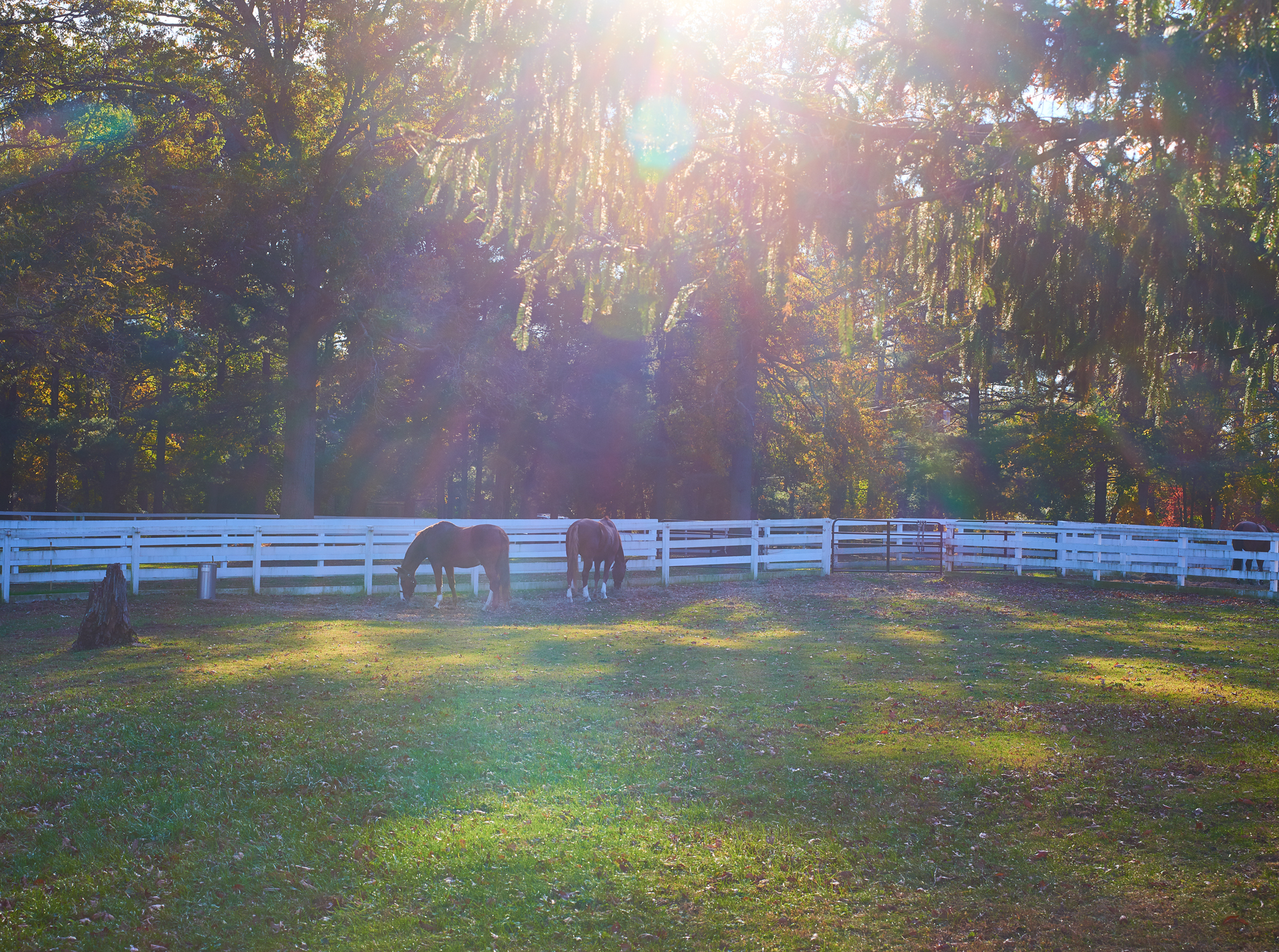
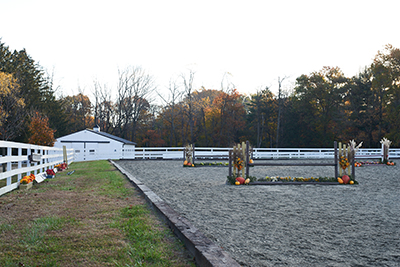
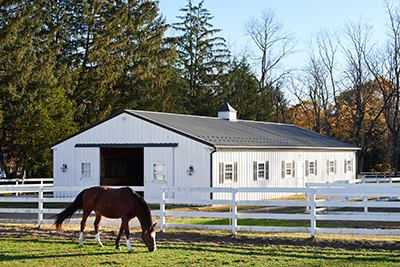
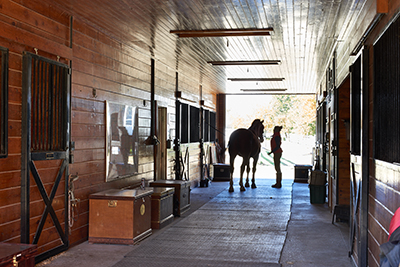
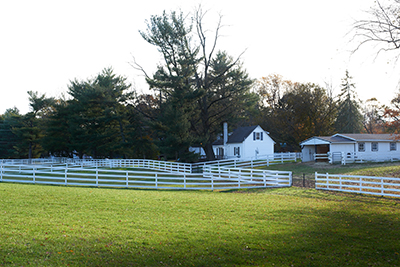
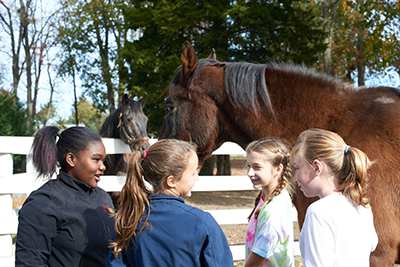
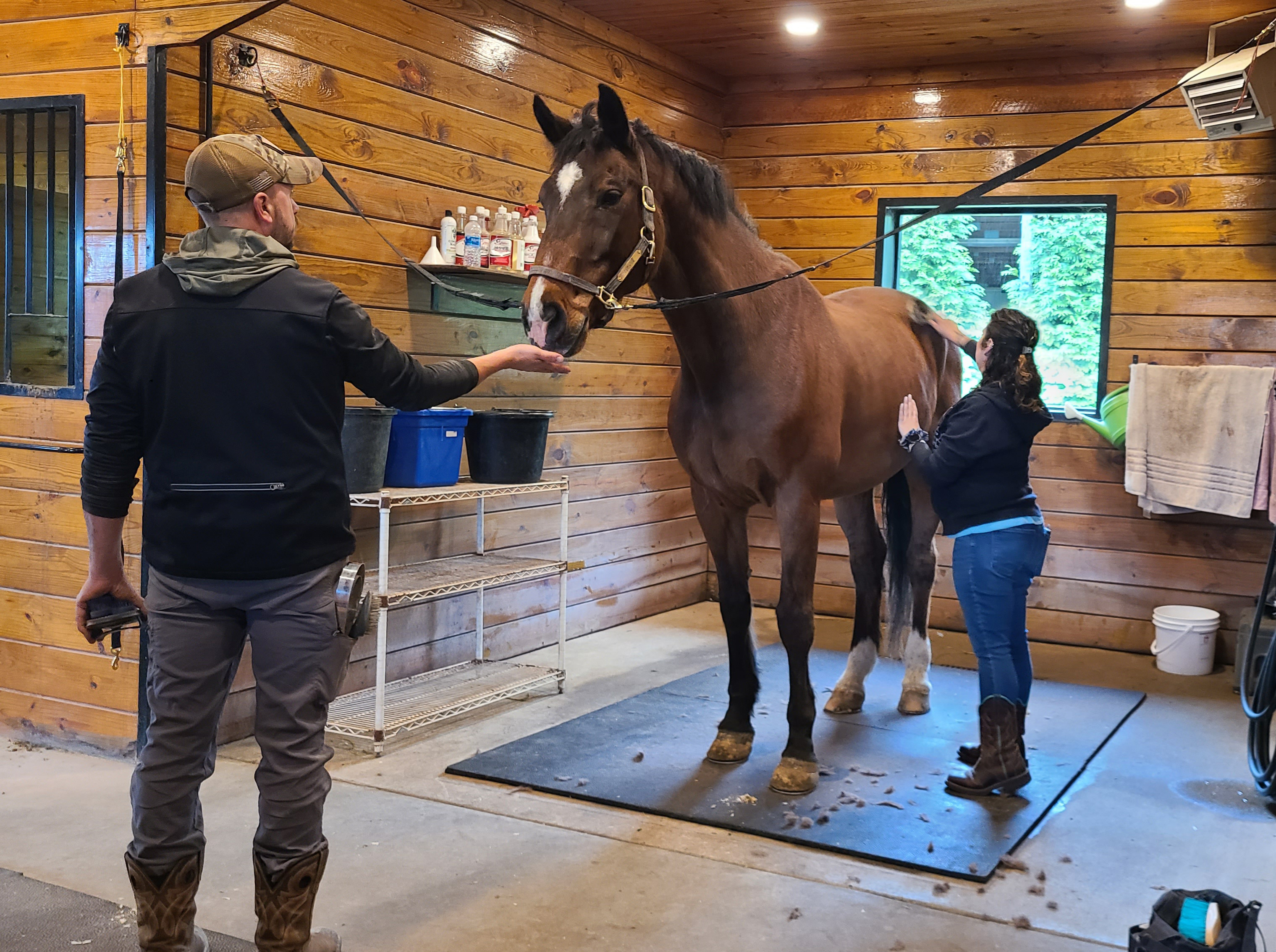
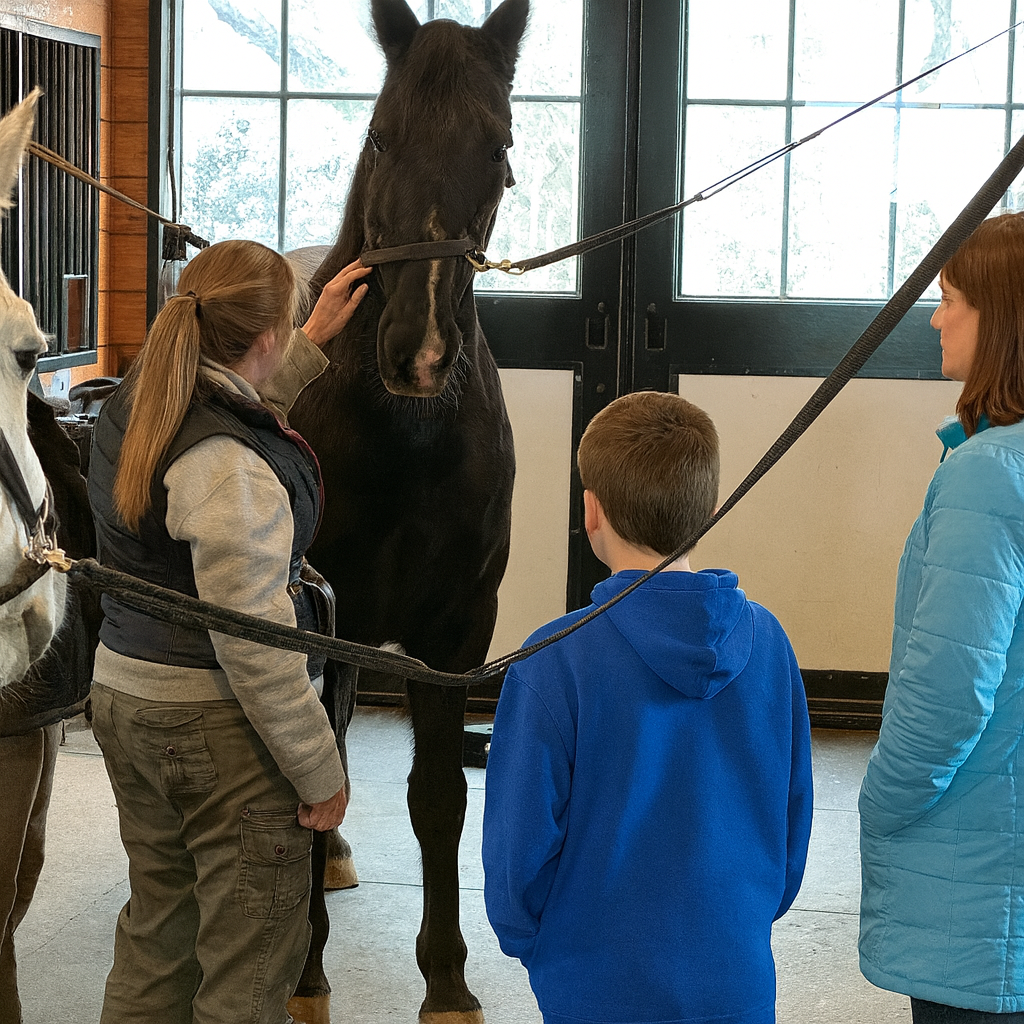
Are the organization's rules, restrictions and warnings (signage) conspicuously posted in easily accessible locations? Yes
Are the organization's emergency contacts, including veterinarian contact information, conspicuously posted in easily accessible locations? Yes
Are human and equine first aid kits easily accessible? Yes
Regarding all shelters where horses are housed including run-in sheds:
Do horses have assigned stalls in the barn/structure(s) or exclusively assigned shelter locations where they are separated from other horses with a barrier? Yes
How many hours per day, on average, are horses stalled or restricted to these sheltered exclusive shelter locations? 9-12
How often are the stalls/shelters cleaned, i.e., kept in good repair and free of standing water, accumulated waste, sharp objects and debris? 6-7 Days a Week
Do all stalls/shelters allow horses to lie down, stand up and turn around and provide protection from inclement weather (wind, sleet, rain, snow and extreme temperatures)? Yes
Are stalls/shelters kept in good repair, with adequate ceiling height, and free of standing water, accumulated waste, sharp objects and debris? Yes
Are floors constructed and maintained for both good drainage and traction? Yes
Is there a ventilation and circulation system in place to allow free flow of air to control temperature, and humidity, and to prevent air stagnation? Yes
Is wiring inaccessible to horses and maintained for safety in all areas of facility? Yes
Are fire prevention/protection measures (fire alarms, extinguishers and sprinkler systems) maintained and in good working order? Yes
Is there adequate lighting to ensure safety in all areas of facility? Yes
How many hours per day, on average, are horses turned out:
Equines are out 4 to 8 hours per day
The following describes the pastures at this facility:
This facility has a written plan in place for pasture management, which includes guidelines for seeding, fertilizing, irrigation, mowing, dragging, harrowing, manure removal, removal of debris, the control of poisonous plants, and a schedule for cleaning
A dedicated staff person(s) is responsible for pasture management
All pastures are fenced to prevent escape or injury
Fencing checks, such as broken or missing planks, loose fence posts, exposed or loose nails, detached wires, etc., are done regularly
Pastures are rotated
Pastures have natural protection for equines (i.e., trees)
This facility does not have pastures where equines can graze on pasture grass
Barbed wire is used for fencing
Electric fencing is used; electric wires or tape fence are visibly marked
Pastures have man-made protection for equines (i.e., shelters)
The following describes the turnout areas other than pastures at this facility:
This facility has a written plan in place for the maintenance of turnout areas, which includes a schedule for cleaning, manure removal, and dragging
A dedicated staff person(s) is responsible for the maintenance of turnout areas
All turnout areas are fenced to prevent escape or injury
Fencing checks, such as broken or missing planks, loose fence posts, exposed or loose nails, detached wires, etc., are done regularly
This facility does not have turnout areas
Barbed wire is used for fencing
Electric fencing is used; electric wires or tape fence are visibly marked
Turnout areas have man-made protection for equines (i.e., shelters)
The following policies and procedures are in place at the facility to restrict public access and to keep horses safe:
The property owner, staff member or caretaker lives on the premises and ensures that public access is restricted and is responsible for the security of the facility and equines
There is a practice in place to monitor equines overnight
No Trespassing signs are posted
Hold Harmless signs are posted
Authorized Personnel Only signs are posted
Entrance gates are locked at night
Visitors are only permitted at specific times
Visitors are only permitted in specific areas
The property is fitted with motion lights
The property is fitted with a security system that is monitored internally by staff (or the property owner)
The perimeter of the property is fully fenced
A security guard is present at night
By Appointment Only signs are posted.
The property is fitted with a security system monitored by police or a professional service
Equine Care/Emergency Preparedness: Gleneayre Farm (*Main) 2026 and 2025 This section is required.
Horse Health Care/Barn Management Records: What system is used to collect and store health/horse care records?
Onsite computer with onsite backup storage system
Onsite computer with cloud-based backup storage system
Our organization utilizes a software application to maintain records
Our organization would use free cloud-based barn management software if available
The following items are consistent with our feed management plan and practices:
Equines are provided with individualized feeding plans, including supplements, according to the equine's age, breed/type, condition, size, work level and any health issues, consisting of nutritious food provided in sufficient quantity and access to adequate natural forage, or be fed daily, or as recommended by the organization's veterinarian
Feed plans are determined in consultation with a veterinarian
Supplement plans are determined in consultation with a veterinarian
Equines are fed grain in individual stalls
Staff and/or volunteers are trained in proper feed measurements and protocols and observed periodically to ensure they are feeding correctly
The feed chart is centrally located and updated as needed
The area(s) where hay, feed, grain, and supplements are stored are kept clean, free of debris and chemicals, and protected from weather and other animals in rodent-proof and mold-proof containers and grain bins
Feed, supplements and hay types are clearly labeled
Water sources, i.e., buckets, troughs, automatic waterers, etc. are kept clean, free of contaminants, debris and chemicals, protected from weather and other animals, and be positioned or affixed to minimize spillage.
Medications are kept in a secure area
Equines are fed grain in groups
Is clean, potable water available at all times for all equines? Yes
Hoof Care: How often is hoof care provided for each equine? Every 4-8 weeks and when an issue arises
Dental Care: How often is dental care provided for each equine? Annually and when an issue arises
Horse checks: How often are equines visually and physically checked by personnel at the facility? Every day or 6 days a week
Our organization has the following parasite and fly/insect control protocols in place, including remedies used to control flies and insects:
Our organization follows the parasite control guidelines of our veterinarian, including fecal testing and de-worming
Fly/Insect Control Remedies:
Fly parasites
Fly Spray Repellent
Fly Masks
Fly Sheets
Fans
The following represent the biosecurity practices in place at facility:
Our organization follows the biosecurity guidelines of our veterinarian
Sick, affected and/or quarantined equines do not have contact with other equines or other animals
The organization has a written biosecurity plan
Staff are trained in best practices related to biosecurity
Volunteers are trained in best practices related to biosecurity
A specific individual is trained and assigned to care for sick, affected and/or quarantined equines
Sick, affected and/or quarantined equines are cared for last if the caretaker must also care for healthy equines
Restricted access signs are posted at primary points of access to sick, affected and/or quarantined equines
Hand sanitizers are available at all primary points of access to sick, affected and/or quarantined equines
Footbaths are available at all primary points of access to sick, affected and/or quarantined equines
Manure and bedding from sick, affected and/or quarantined equines is removed from the facility - not put in open air piles, and not spread on pastures
Quarantine areas, such as stalls, aisle ways, paddocks, and common areas, are cleaned (and needed, disinfected) after conclusion of the quarantine.
Trailers/vans used by sick, affected and/or quarantined equines are cleaned and disinfected after each use and cleaning takes place away from where equines are sheltered
Equipment used by sick, affected and/or quarantined equines is not shared
Equipment used by sick, affected and/or quarantined equines is cleaned of organic debris and disinfected after each use
Latex gloves, or equivalent gloves, are worn when working with sick, affected and/or quarantined equines
Equines are not quarantined on arrival.
The following represent the manure removal practices in place at facility:
Manure is stored in dumpster(s)
Manure is hauled, sold or given away
Our organization adheres to the manure management guidelines set by the state, local authorities, and/or our organization's veterinarian
Manure is piled in an area where equines are not located
Manure piles are covered
Manure piles are composted or spread on pastures
The following steps are taken to help staff and volunteers readily identify each horse on the property:
Equines are assigned the same exclusive stall/shelter location each day
Name plates are located on the stall/shelter location
A notebook or binder with photos and information on each equine is easily accessible
A map/diagram is posted showing the location of each equine with equine names and photos
Equine photos and profiles are available on the website
Staff and volunteers are provided with an information packet with equine profiles, including photos and detailed descriptions
Team leaders work with new staff/volunteers until they are able to identify the equines
Photos are located on the stall/shelter location
Equines wear halters with nametags
Staff/volunteers are provided training on conformation, markings, colors, and breeds
Our organization has the following policies and procedures in place pertaining to tack, apparel and equipment:
All equines have specifically assigned apparel, equipment and tack (saddles/bridles if ridden) that is not shared
Blankets, sheets and turn out apparel are fitted and utilized for each equine appropriate to the equine's needs and the weather conditions
Blankets, sheets and turn out apparel are cleaned regularly as needed
Riding Tack is always cleaned after each use
Riding Tack is inspected for overall working condition before each use by trained personnel
Riding Tack is assessed for fit before each use by trained personnel
Riding Tack is assessed for fit by trained personnel when an equine's body condition changes
Riding Tack is assessed for fit by trained personnel when an equine's disposition changes
Assigned riding tack is clearly labeled
Riding Tack is stored in a climate-controlled location
Helmets are replaced after a fall
Saddles are shared
Saddle pads are shared
Bridles are shared
Bits are shared
Blankets are shared
Sheets are shared
Turnout apparel is shared
Halters are shared
Riding Tack is always cleaned at least weekly
Riding Tack is cleaned only when needed
This facility enlists the services of a professional saddle fitter at least once a year
Helmets are shared
Helmets are cleaned/disinfected after each use
Helmets are replaced at least every five years.
No equines are ridden; saddles, bridles, etc. not applicable.
Emergency Preparedness: Gleneayre Farm: *Main This section is required.
The following plans, policies, and procedures are in place at the facility to handle emergencies and address weather related issues, fire safety procedures, and/or any additional hazardous scenarios the facility could potentially experience:
Emergency procedures are posted prominently
The facility owns or has access to a generator
The facility maintains at least two weeks of hay, feed, shavings and medications
The facility collects and maintains medical information from staff, volunteers, and clients
The facility maintains appropriate liability and/or workers' compensation insurance
The organization has a written emergency preparedness/safety plan (EPP)
Local fire department and/or the state's emergency planning department procedures
Medical emergencies for clients, staff, and volunteers
Medical emergencies for equines
Evacuation plans
Power outages
Fire
Natural Disasters - thunderstorm, hurricanes, earthquakes, tornados, etc
Protocols to notify emergency personnel
Building/facility exit plans
Terrorist attacks
The facility follows the specific procedures to help PREVENT emergency situations:
Smoking is strictly prohibited
NO SMOKING signs are posted prominently
Permanent or temporary structures where equines are stalled are kept free of dust, cobwebs, trash, cleaning rags, and other flammable items
Aisles and doorways are kept clear
Heaters with automatic shutoff settings are used
Hay is stored away from permanent or temporary structures where equines are stalled
How often are the following checked or performed?
Fire Extinguishers are checked: Monthly
Smoke detectors are checked: Monthly
Fence lines are checked: Daily
Turnout Areas are checked: Daily
Sprinkler systems are checked: Not at all/NA
Fire drills are conducted: Not at all/NA
Review of safety protocols with staff are conducted: Monthly
Review of safety protocols with volunteers are conducted: Monthly
The Emergency Preparedness Plan is reviewed and updated: Monthly
Equine Transportation: 3= Onsite: 3 (2 + 1) + Offsite: 0
2-horse van/trailer with truck:
1 Owned onsite
3-horse van/trailer with truck:
1 Access onsite but not owned
6-horse van/trailer with truck:
1 Owned onsite
© Copyright 2018 EQUUS Foundation 84 5.00